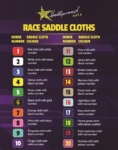Types of races and progressions
North American racing employs a class system. Horses must progress through this system before they can become stars. Here we outline the types of races they typically participate in, starting from the least competitive ones.
Maiden Races
A racehorse that has yet to win a race is referred to as a maiden. The term “breaking his maiden” is used when the horse wins its first race. While there’s no rule stating that a horse must start its career in maiden races and stay at that level until it wins, it’s worth noting that first-time starters rarely win. On the other hand, second-time starters generally show significant improvement.
Experienced maidens with speed scores that matched the average in their previous race are often tough competitors.
There are two categories of maiden races:
Maiden claiming races typically include horses that haven’t had success against maiden special weight competitors or aren’t considered ready to compete at a higher level. This is often regarded as the biggest class drop in racing. When owners or trainers eventually lower their horse’s claiming price, it’s usually a reluctant move aimed at securing a win.
This level is considered the bottom tier of horse racing and is one of the most challenging to predict.
Maiden special weight races feature high-quality horses expected to break their maiden status quickly and advance to more prestigious competitions. In this category, the horses are protected, meaning they’re not for sale. These types of maiden races usually favor faster horses.
Claiming Races
In a claiming race, every horse has a price tag. This means it can be bought or “claimed” from the race for this price. To claim a horse, a request must be submitted before the race. The requester becomes the new owner of the horse after the race, regardless of the horse’s performance. If the horse finishes in a winning position, the original owner receives the purse or winnings. The new owner takes ownership of the horse, even if it gets injured or dies in the race.
Claiming races vary widely in class, based on the prices of the horses. The highest level is the optional claimer, where the prices are often quite high. Horses can be entered to be claimed or not, at the owner’s discretion.
Claiming prices are typically higher at major tracks like Belmont or Santa Anita, and lower at minor tracks like Portland Meadows or Thistledown. The lower a horse’s claiming price, the lower its quality. Races usually feature horses within similar price ranges. It’s unlikely that a horse valued at $65,000 would run against a $10,000 horse in the same race. While the $65,000 horse could easily win, the owner risks losing the horse for a mere $10,000.
Horse owners prefer not to give their horses away, so they often run them in nonselling races, such as maiden special weight races, or allowance and optional claiming races. However, for various reasons, an owner may enter his horse into a claiming race. Perhaps he needs to recoup some of his investment, or the horse needs a win to boost its perceived value. In such cases, the owner will value the horse and enter it into the appropriate claiming race.
Allowance Races
Allowance races are a step up from claiming races. The horses in these races aren’t for sale, and the potential winnings, or purses, are higher.
The horses in these races must carry a specific weight, or are allowed to carry less weight due to certain conditions. This is why they’re called “allowance” races. Typical conditions include only allowing non-winners of a certain number of races other than maiden, claiming, or starter to participate. The allowance is typically five pounds less than the assigned weight if the horse hasn’t won since a specific date, or if it hasn’t won a certain amount of money. These five pounds can make a significant difference. It’s widely accepted that a horse will run about a length slower for each additional pound it carries compared to its competitor, assuming they’re equally talented.
A starter allowance race is a specific type of allowance race, restricted to horses that have started for a maximum claiming price.
Stakes Races
Stakes races are prestigious events where top racehorses compete. The prizes, or purses, vary greatly from a few thousand dollars at small local stakes races to millions at major races like the Kentucky Derby and the Breeders’ Cup Classic.
Local stakes races often feature the best local horses and may have restrictions, such as requiring the horses to be bred in the state. These races, known as restricted stakes, can offer substantial purses, providing incentives for owners and trainers to breed and race locally.
Graded stakes races are the top level and are open to the best horses from local barns as well as those from around the country or even abroad. These races have no restrictions other than the age or gender of the horses. The Graded Stakes Committee assigns three grades to these races: Grades 1, 2, or 3, with Grade 1 being the highest caliber. These grades are reviewed and adjusted annually based on the performances of the horses in those races. Most midsize tracks host at least one Grade 3 race, while larger tracks like Belmont Park, Keeneland, Churchill Downs, and Santa Anita hold several races of all grades.
In 2016, there were 788 unrestricted races in the U.S. with purses of at least $75,000. Of these, 464 were assigned graded status: 109 were assigned Grade 1, 133 to Grade 2, and 222 to Grade 3. High-profile races like the Triple Crown series and the Breeders’ Cup races fall under Grade 1. Horses that compete in these races are the cream of the crop, and those who perform well but do not win may find victory by dropping to a lower grade of race.
Outline of race classes
Here is an outline that attempts to rank the various types of races (from lowest quality to highest). Remember, anytime a restriction excludes a portion of the horse population, it weakens the class of the race.
- Maiden races (never won a race)
- Maiden claiming (sometimes owners drop them in here because they are injured and they want to dump them). This is the lowest class level and typically the slowest horses on the grounds. Equal to about 8k-12k claiming.
- Maiden special weight (MSW). If limited to state-breds would be weaker than an open MSW. Equal to about 12k-16k claiming.
- Claiming races (horses can be claimed for a price)
- Range from 6k on up. The horse becomes the property of the new owner as soon as the starting gate opens, though any purse money the horse earns in that race goes to the previous owner.
- Allowance races (horses carry weight to even them out – horse will run about a length slower for each pound carried)
- Starter allowance (for upper claiming-level horses)
- Optional claiming (OC) – combination of selling and non-selling race
- Allowance – too talented for claiming ranks and ready to move up
- N1X – For horses that have not won another allowance race or a graded stakes (equal to about 40k claiming).
- N2X – For horses that have not won more than one allowance race (equal to about 63k claiming).
- N3X – For horses that have not won more than two allowance races (equal to about 80k claiming).
- N4X – For horses that have not won more than three allowance races (equal to about 100k claiming).
- Stakes races
- Overnight stakes – lowest stakes, essentially allowance races with higher purse
- Restricted stakes – very concise stakes are written for these
- Non-graded stakes – stepping stone to graded stakes
- Graded stakes races
- Grade III
- Grade II
- Grade I
Common race type codes
Finally, here are the common race types codes.
Mdn/Msw – Maiden special w3eight
Mcl – Maiden claiming
Clm – Claiming
Ocl/Aoc – Allowance optional claiming
Alw – Allowance
Hcp – Handicap
Sta/Str – Starter allowance
Shp – Starter handicap
Stk – Stake
Cst – Claiming stakes
Moc – Maiden optional claiming
Mst – Maiden stakes
Inv – Invitational
Dby – Derby
Trl – Trials
Fut – Futurity
Common race classifications
G1 Grade 1 stakes
G2 Grade 2 stakes
G3 Grade 3 stakes
100k Listed stakes
Handicap 40k Overnight handicap
Alw59000 Allowance race with no conditions
Alw57000c Allowance with multiple conditions
Alw56000n$y Non-winners of X money since date
Alw54000n1T Non-winners of a race on the turf
Alw53000n1m Non-winners of race one mile or more
Alw52000n4x Non-winners of 4 races other than maiden, claiming or starter
Alw51000n2L Non-winners of 2 races lifetime
Alw5000s Starter allowance for horses that have started for $5,000 or less
Hcp5000s Starter handicap for horses that have started for $5,000 or less
OClm 25000N Optional claiming – not to be claimed
OClm 25000 Optional claiming – to be claimed
Clm 25000 Open claiming
Clm 25000n2L $25,000 claiming for non-winners of 2
Clm 25000n1y For non-winners of a race since date
Md Sp Wt Maiden Special Weight
Md 32000 Maiden Claiming
Symbols often seen in Race Conditions

Betting strategies related to race classes
Avoid betting the bottom rung of classes
Class levels for horses at the racetrack can fluctuate, similar to a ladder. However, one constant is that the bottom level, representing the least competitive horses, remains the same no matter where the horse races. Whether the horses are novices or winners, it’s generally advisable to avoid the lowest-tier horses, with one exception. If a horse competes at the bottom level for the first time, it might be worthwhile to place a bet on it, given the right odds. The other horses at this level have demonstrated a lack of desire to win another race. Therefore, the horse moving down in class could be a better choice than those consistently performing at the bottom level.
Horses shipping in from major circuits
When a lower-level horse moves from a major circuit to a smaller racetrack, the public often overbets on it, assuming it’s classier.
Betting Maidens
First-time starters often struggle to win maiden races. The initial break and bump from the gate, the chaos of horse traffic, the kickback of dirt, running mishaps, the repeated whip stings, late-stage exhaustion, and competitive pressure can defeat even the best of them. For first starters, you mainly rely on workout numbers, trainer, and sire information.
Second-time starters win more often in maiden races. They’re a good bet if they matched the average speed last time or are projected to meet the average speed for this race.
Betting Maiden Claiming
Most maiden claiming winners typically fit one of four general categories.
- Droppers from higher maiden class levels.
- A high percentage of winners come from here – it’s one of the steepest class drops in racing. In fact, a drop from MSW is a good bet even if they only finished in the first half of the field.
- Look for droppers that stayed in contention in the pace call (3rd call, typically with quarter mile remaining), even if they faded in the stretch. They might just need a drop in class to win.
- Previously finished in the money at the level of today’s race.
- Any horse that has not lost at the level of today’s race is a contender, even if they are dropping back from a higher class.
- Have displayed early speed.
- First-time starters with steady works, and a trainer and jockey who


